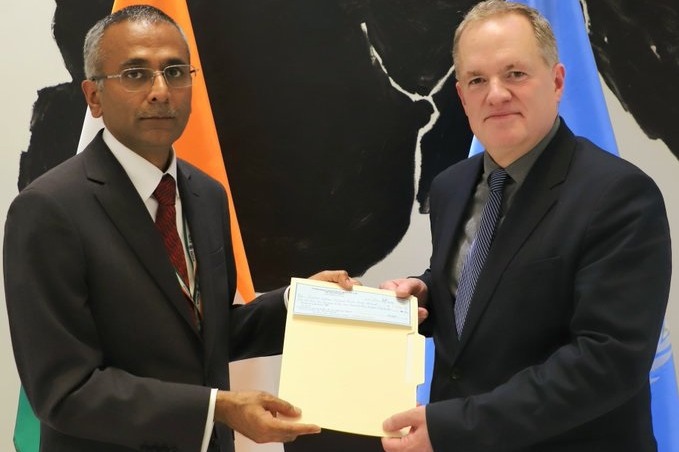India gives UN $1.16 million for promotion of Hindi

United Nations, June 28: India has contributed $1.16 million to the world organisation for the promotion of Hindi.
R. Ravindra, the charge d'affaires of India's Permanent Mission, gave the cheque on Thursday to Ian Phillips, the director of the News and Media Division of the UN's Department of Global Communications (DGC).
The contribution is a special payment made in addition to the assessments for the UN's regular and the peacekeeping budgets "to mainstream and consolidate news and multimedia content of DGC in the Hindi language", the mission said.
India has partnered with the DGC since 2018 when the Hindi @ UN project was launched "to enhance the public outreach of the United Nations in the Hindi language, and to spread greater awareness about global issues among millions of Hindi-speaking people around the world", according to the mission.
The UN produces an audio Hindi news bulletin every week on matters relating to the world organisation.
The UN also maintains X, Instagram and Facebook social media accounts in Hindi, in addition to a news website.
Prime Minister Narendra Modi has spoken at the UN in Hindi, with simultaneous translation provided by India.
The late Indian Prime Minister Atal Bihari Vajpayee was the first to speak in Hindi at the UN when he addressed the General Assembly as External Affairs Minister in 1977.
The UN started with five official languages, English, French, Chinese, Russian, and Spanish, in which simultaneous interpretations of meetings are made, and official documents produced and, starting in 1973, Arabic was added.
There has been a push to add to the UN's range of multilingualism, but the main constraint is finance, and that is why India is paying for the Hindi initiative.
German-speaking Austria and Germany (at that time comprising East and West Germanies) undertook to cover the expenses for a translation service covering documents of some UN bodies.
The DGC has increased the use of Kiswahili and Portuguese, languages used in Africa, in social media and in radio and TV programmes.
It also started producing important announcements and officials' messages in Persian, Bangla and Urdu.
R. Ravindra, the charge d'affaires of India's Permanent Mission, gave the cheque on Thursday to Ian Phillips, the director of the News and Media Division of the UN's Department of Global Communications (DGC).
The contribution is a special payment made in addition to the assessments for the UN's regular and the peacekeeping budgets "to mainstream and consolidate news and multimedia content of DGC in the Hindi language", the mission said.
India has partnered with the DGC since 2018 when the Hindi @ UN project was launched "to enhance the public outreach of the United Nations in the Hindi language, and to spread greater awareness about global issues among millions of Hindi-speaking people around the world", according to the mission.
The UN produces an audio Hindi news bulletin every week on matters relating to the world organisation.
The UN also maintains X, Instagram and Facebook social media accounts in Hindi, in addition to a news website.
Prime Minister Narendra Modi has spoken at the UN in Hindi, with simultaneous translation provided by India.
The late Indian Prime Minister Atal Bihari Vajpayee was the first to speak in Hindi at the UN when he addressed the General Assembly as External Affairs Minister in 1977.
The UN started with five official languages, English, French, Chinese, Russian, and Spanish, in which simultaneous interpretations of meetings are made, and official documents produced and, starting in 1973, Arabic was added.
There has been a push to add to the UN's range of multilingualism, but the main constraint is finance, and that is why India is paying for the Hindi initiative.
German-speaking Austria and Germany (at that time comprising East and West Germanies) undertook to cover the expenses for a translation service covering documents of some UN bodies.
The DGC has increased the use of Kiswahili and Portuguese, languages used in Africa, in social media and in radio and TV programmes.
It also started producing important announcements and officials' messages in Persian, Bangla and Urdu.